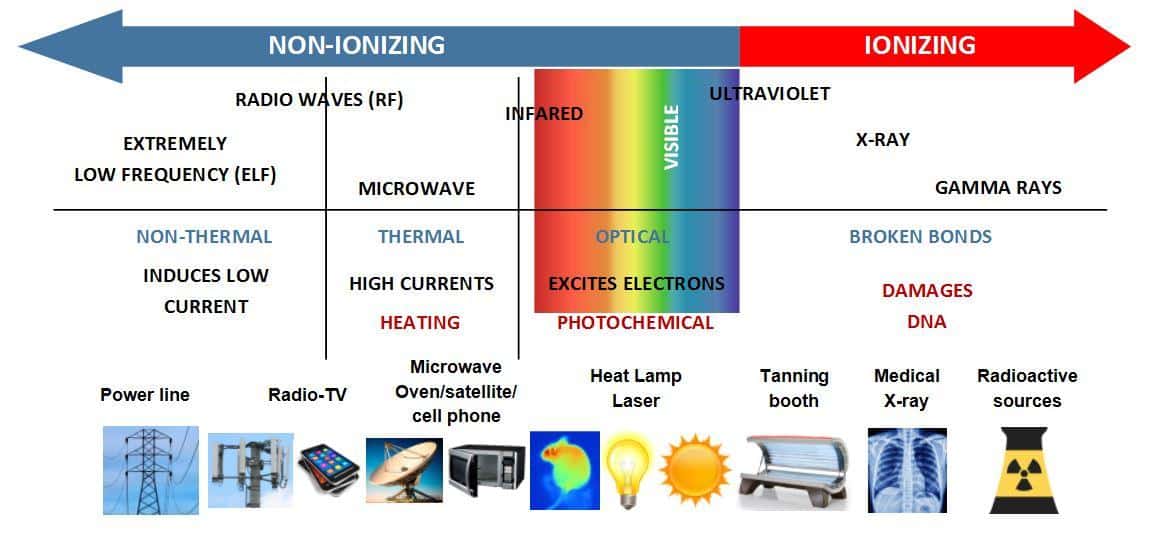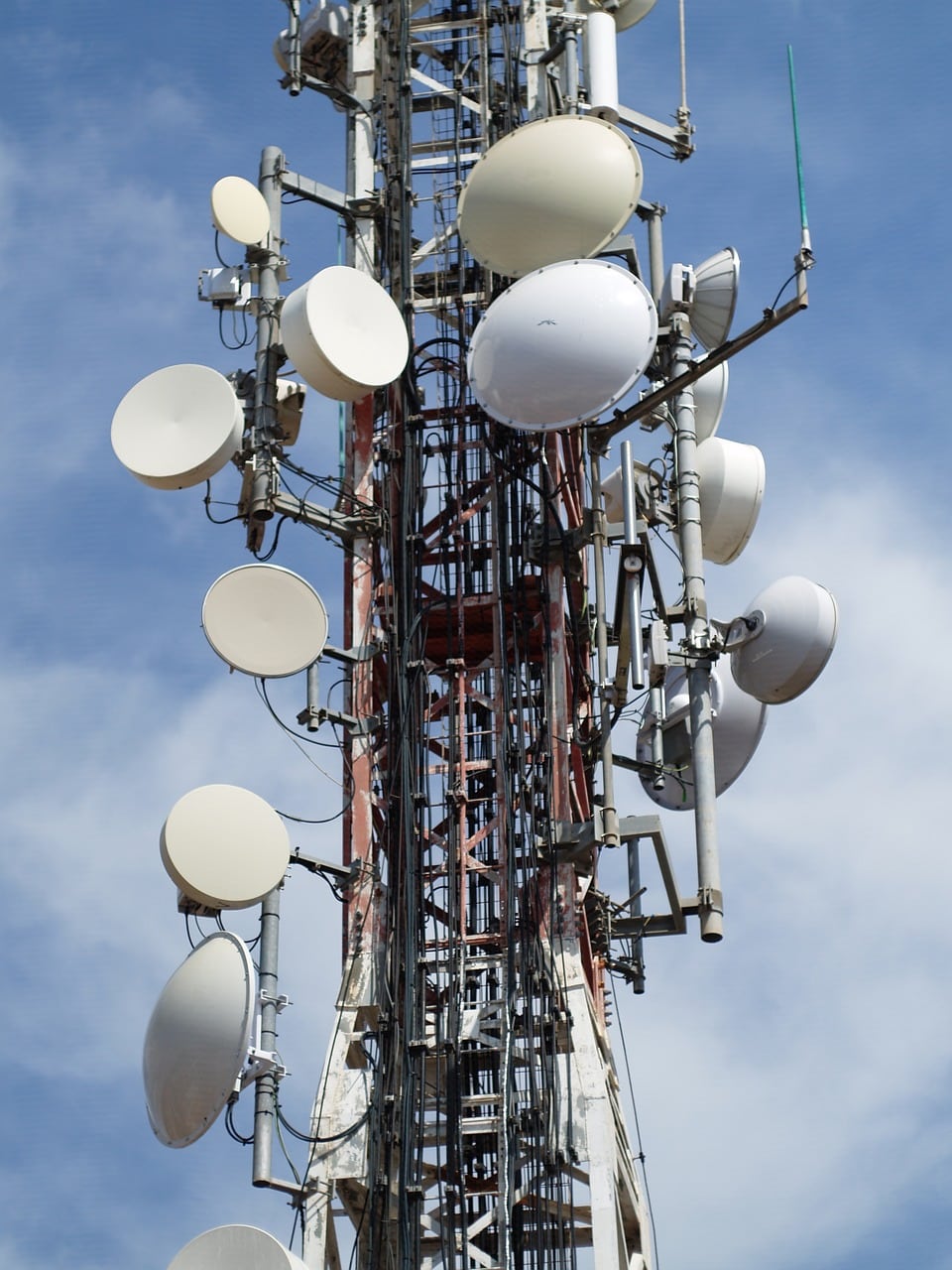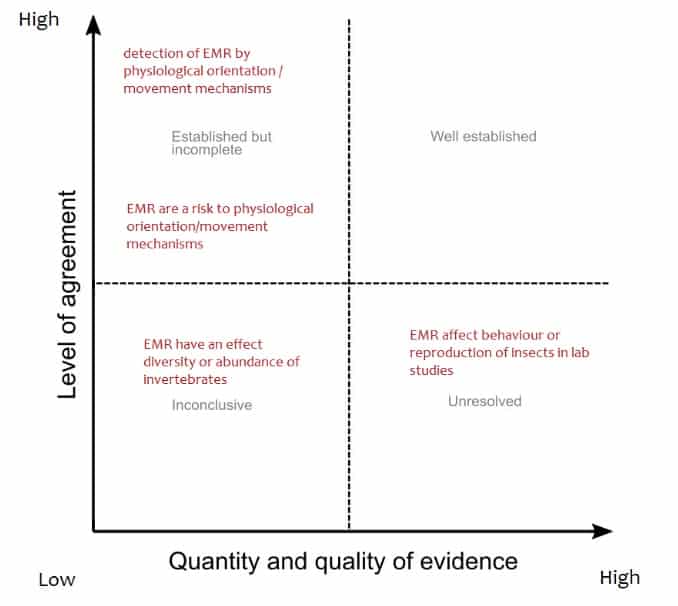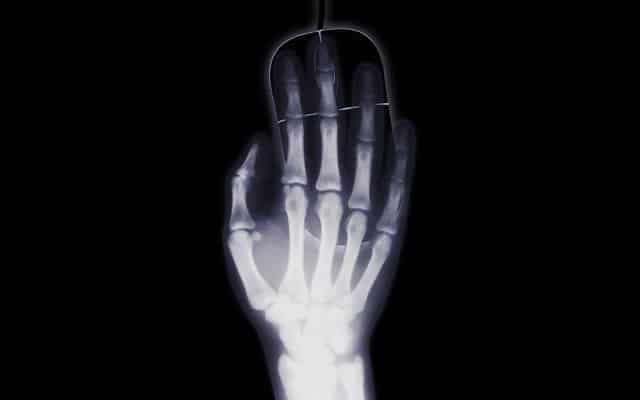From TV to cell phone, from CT scan to weather forecasting, from Wi-Fi to astronomy, electromagnetic waves are everywhere around us. However, most of us are not aware of their harmful effects and believe whatever we hear about them. So, I wrote this blog post to help everyone understand the dangers of electromagnetic radiation.
Generally, electromagnetic waves, which have higher energy, are more dangerous than those with lower energies. However, to understand which radiation is more harmful, and why it is harmful, we have to know how it transfers energy as it passes through matter.
There are two methods in which EM waves transfer energy to biologic material.
Types of radiation
Based on how they interact with matter, electromagnetic waves can be broadly classified into two types.
1. Non-Ionizing waves (Excitation)
The EM wave transfers energy to an electron in the outer shell to move it to an inner shell of higher energy without removing the electron from the atom. The process is called excitation, and the wave is called a non-ionizing wave.
Harmful effects of Non-ionizing EM waves
Non-ionizing waves are not harmful when exposed to, in small doses.
But when exposed to high doses, they can significantly heat the body tissues (for example, microwave oven). Wearing regular clothing can protect against a normal dosage of these waves.
If the source of non-ionizing waves is extremely hot, it can induce thermal ionization of atoms.
2. Ionizing waves (Ionization)
The EM wave transfers enough energy to remove (eject) one or more electrons from the atom. The process is called ionization and the wave that is capable of doing it is called an ionizing wave.
Harmful effects of Ionizing EM waves
Ionizing electromagnetic rays are extremely hazardous to life. They can cause damage to us in one of the following two ways.
- damage a tissue (For example, sunburn) by killing the cells in the tissue, when exposed to high doses, or
- cause cancer and genetic diseases by changing the DNA in the cells, when exposed to lower doses.
Food for thought:
Why do small doses of exposure to ionizing EM waves have long-lasting consequences than high doses of exposure?
After the DNA in the cells are broken down, our bodies are more likely to repair the damage if the radiation's dosage is high. If the dosage is low, our bodies likely ignore the damage caused. Hence, lower doses can cause long-lasting consequences like cancer or genetic diseases.

Harmful effects of Ionizing vs non-Ionizing EM waves
Picture credits
Why doesn't harmful radiation from outer space harm us?
Earth's atmosphere and magnetic field act as a shield blocking all the dangerous ionizing waves from entering the earth. The picture below depicts this (In the picture above, Gamma-rays are at the far right. However, in the picture below, they are in the far left).
Life wouldn't have been possible on earth without this natural protection.

Atmospheric opacity (absorption) vs Wavelength of EM waves
Picture credits
Dangers of Electromagnetic Radiation on Humans
1. Low-Frequency Radio waves (Wavelength > 3 km)
Power stations produce low-frequency radio waves. If the magnetic field in the power lines is strong enough, these radio waves can produce small currents in the bodies of people standing directly under them. If the currents induced in the body are large enough, they can stimulate the nerves and muscles, and affect the biological processes. However, it is very rare.

Power lines
The induced currents are generally not strong enough to heat the tissues in the body. Hence, they aren't as harmful as other ionizing and non-ionizing waves.
2. Radio and Microwaves
Radio waves and microwaves, used for mobile communication and transmission of television and radio signals, can create thermal effects in our bodies. But this can only happen at high radiation levels, which does not occur by regular use of these devices. At regular usage levels, the dangers of electromagnetic radiation are negligible.

A cell-phone tower
Hence, radio waves and microwaves are harmless to the human body when they are under the recommended limits of radiation. Under normal daily use of mobile phones, TV and radio, these waves don't possess sufficient energy to heat the exposed body parts.
People working on carrier decks in military aircraft have to wear suits that reflect microwaves to protect against radar systems. However, they are powerful radar systems, not normal mobile phones or Wi-Fi.
Which body parts are the most affected, upon over-exposure?
Your eyes and Testes are most affected upon over-exposure to radio and microwaves because these parts lack blood supply, which can dissipate the heat easily.
Food for thought:
Can radio waves and microwaves harm you, if you use mobile phones, televisions, radios and microwave ovens regularly?
No, because, under normal usage, the waves emitted by these devices don't possess sufficient energy to heat the exposed body parts.
Can using Bluetooth headphones harm your body more than your cell phones?
No. On the contrary, using Bluetooth headphones is recommended. Bluetooth devices use higher wavelength radio waves that have lower energies. So, using Bluetooth headphones is less harmful than keeping the constantly-transmitting mobile phones near your ears (and your brain).
Are the EM waves from a cell phone/radio/television transmission tower harmful for human beings?
No. But, if you directly stand in front of the transmitting antennas on the tower for sufficient time, some of your tissues may get burned. These antennas send concentrated beams of radio waves/microwaves to satellites. So, they point directly to the satellites in the sky and not to the ground. In addition to that, the power density of the waves rapidly falls as one moves away from the antenna. Since these antennas are mounted on high towers, the power density of the waves on someone standing under such a tower is hundreds of times lesser than the recommended limits.
Can radiation from cell phone towers affect birds and bees?
The popular belief is that the radio waves and microwaves from cell-phone towers affect the navigational abilities of birds and bees. However, no convincing proof is available on the subject.
In 2018, Eklipse organized a web conference of experts to discuss the effects of electromagnetic radiation on wildlife. They analyzed 147 publications (research papers) on the subject and came to a conclusion.
Most experts agreed that EM waves affect the navigational sense of birds and bees, and the metabolism of trees. However, they couldn't find any convincing proof in the analyzed researches. The graphs below summarize the findings of the conference.
What does it mean?
Radio waves and microwaves emitted by cell-phone, television, and radio towers might have led to a decrease in bird and bee population. However, these waves might not be the only reason. It could have been one of the reasons. Other reasons could be pollution, lack of food, danger from other species, etc.
Do radio waves and microwaves disrupt the magnetic sense of birds?
The picture below shows the quality of evidence (Do credible and repeatable research data exist?) of a statement vs. the number of people who agreed for it.
You will notice that the statement "Magnetic sense of birds are disrupted by RF" has been accepted by several experts. However, the results of the analyzed researches on that hypothesis are not credible enough; i.e., it cannot be proved.

Harmful effects of Em waves on Vertebrates
Read more
Can radio waves and microwaves affect the sense of orientation of Bees?
The picture below shows the quality of evidence of a statement vs. the number of people who agreed for it.
Several experts have accepted the statement "Detection of EMR by physiological orientation/movement mechanisms" (EM waves can make bees lose their sense of direction). However, the results of the analyzed researches on that hypothesis are not credible enough; i.e., it cannot be proved.

Harmful effects of Em waves on Vertebrates
Read more
3. Infrared waves
Greenhouse effect
Infrared waves are the reason behind the Greenhouse effect, that rapidly heats our planet. The clouds and the earth's surface reflect the sun's waves as IR waves into the atmosphere. As a result, these waves leave the atmosphere into space.
However, gases like Chlorofluorocarbons, water vapor, oxides of sulfur and nitrogen can trap the IR radiation in the atmosphere. These gases are released by human activity. So, as the human activity
increases, the concentration of these gases in the atmosphere increases. Therefore, more and more IR radiation gets trapped in the earth. Ultimately, this leads to global warming.
Damage to eyes
Prolonged exposure to IR waves can heat your eyes. As a result, you might get cataract, retinal burns and corneal ulcers.
For example, workers who work in iron and glass production factories might suffer from Glassblower's cataract. Glassblower's cataract is the name given to changes that occur in the eyes of workers who look at glowing iron or glass without protective eye-wear every day.
4. Visible light
Damage to eyes
Looking at extremely bright visible light can lead to retinal injury. Moreover, it could cause temporary or permanent blindness depending on the exposure.
5. UV light
Exposure to the higher wavelengths of UV light at limited amounts can be beneficial to health (formation of Vitamin D). But overexposure can lead to wrinkling of the skin, skin aging, skin burns, and skin cancer.

Sunburn on a woman's back.
By FAL101 at English Wikipedia - Own work by the original uploader, CC0, Link
Are tanning beds or salons safe?
Tanning beds use more concentrated UV light to produce a tan. Hence, they have the same chances of causing cancer as smoking. In addition to that, tan itself is dangerous because it is the response of your body against UV damage to your skin.
UV rays in the lower part of the electromagnetic spectrum (wavelengths below UVA and UVB) are ionizing, i.e., they possess enough energy to strip the electrons from atoms and molecules, thereby ionizing them.
6. X-rays
Since X-rays are ionizing, they pose a health risk to humans. The use of X-rays for medical imaging might be widespread. But, every time you get an X-ray scan, your risk of getting cancer increases slightly. However, this risk depends on the part being scanned.

X-ray of a person's hand while using a mouse
7. Gamma-rays
Like X-rays, Gamma-rays are also ionizing, i.e., depending on the dosage, they may either damage the tissues and kill the body cells, or create cancer and genetic diseases.

Gamma rays have no charge. So, they do not interact with matter and have higher penetration power.
They can also pass through bones and teeth and carry very high energy. So, the health risks are even greater than that of X-rays.
We hope that this blog post helped you understand the danger of electromagnetic radiation. If you liked this blog post, check out our other blog posts too:
